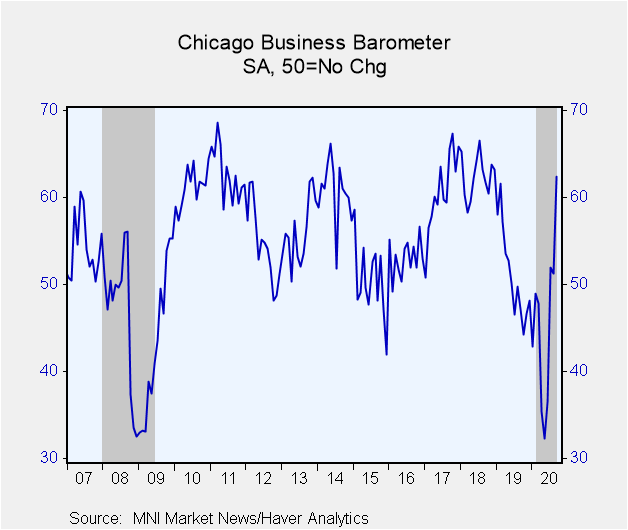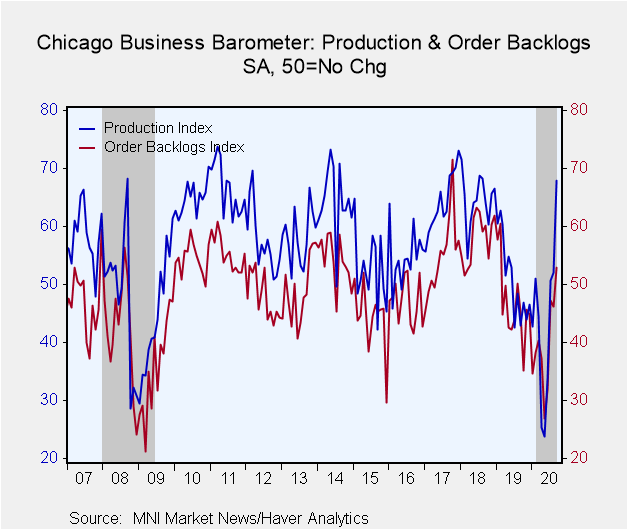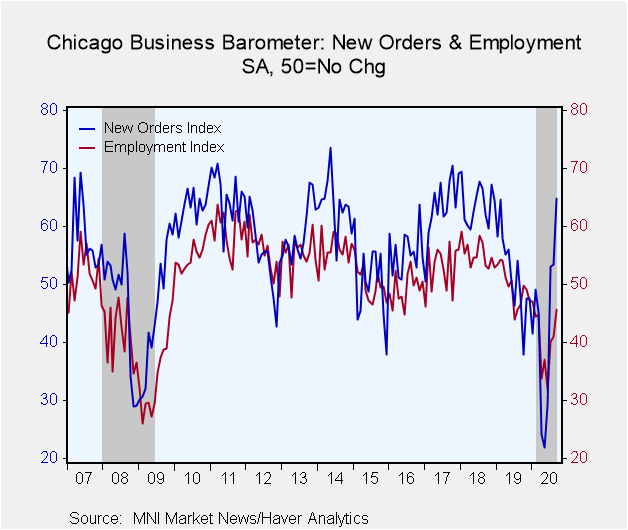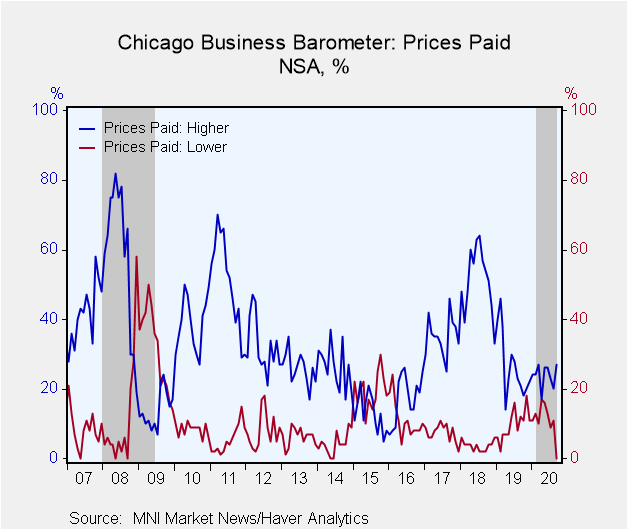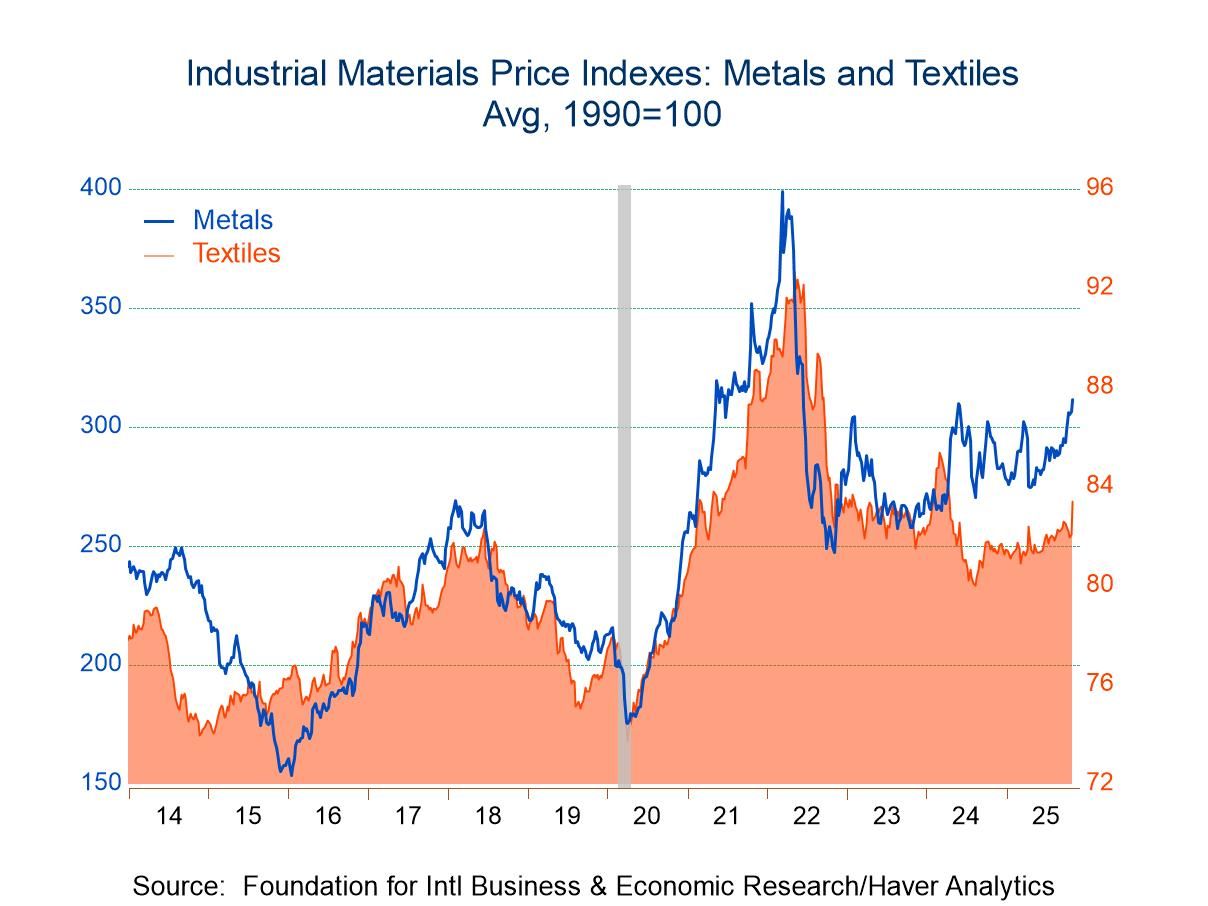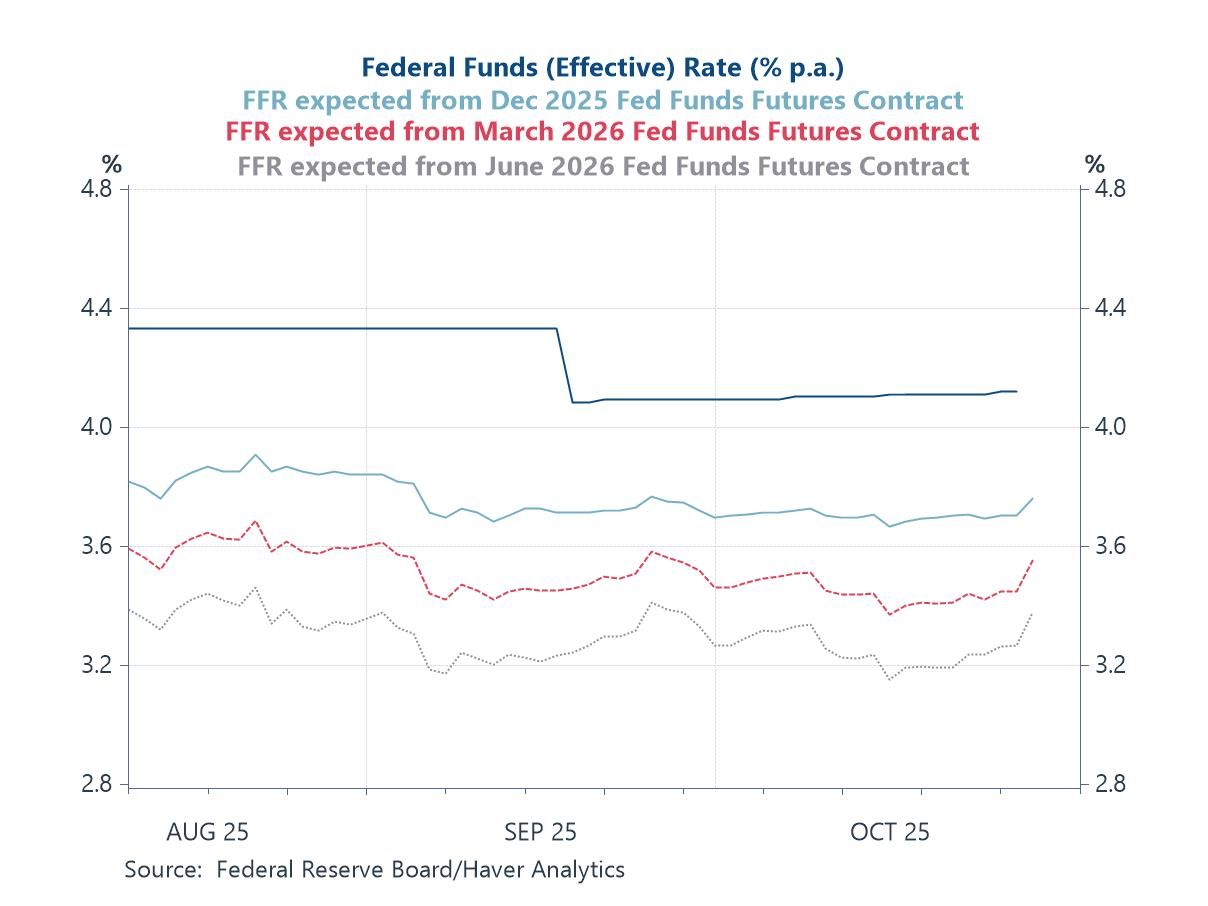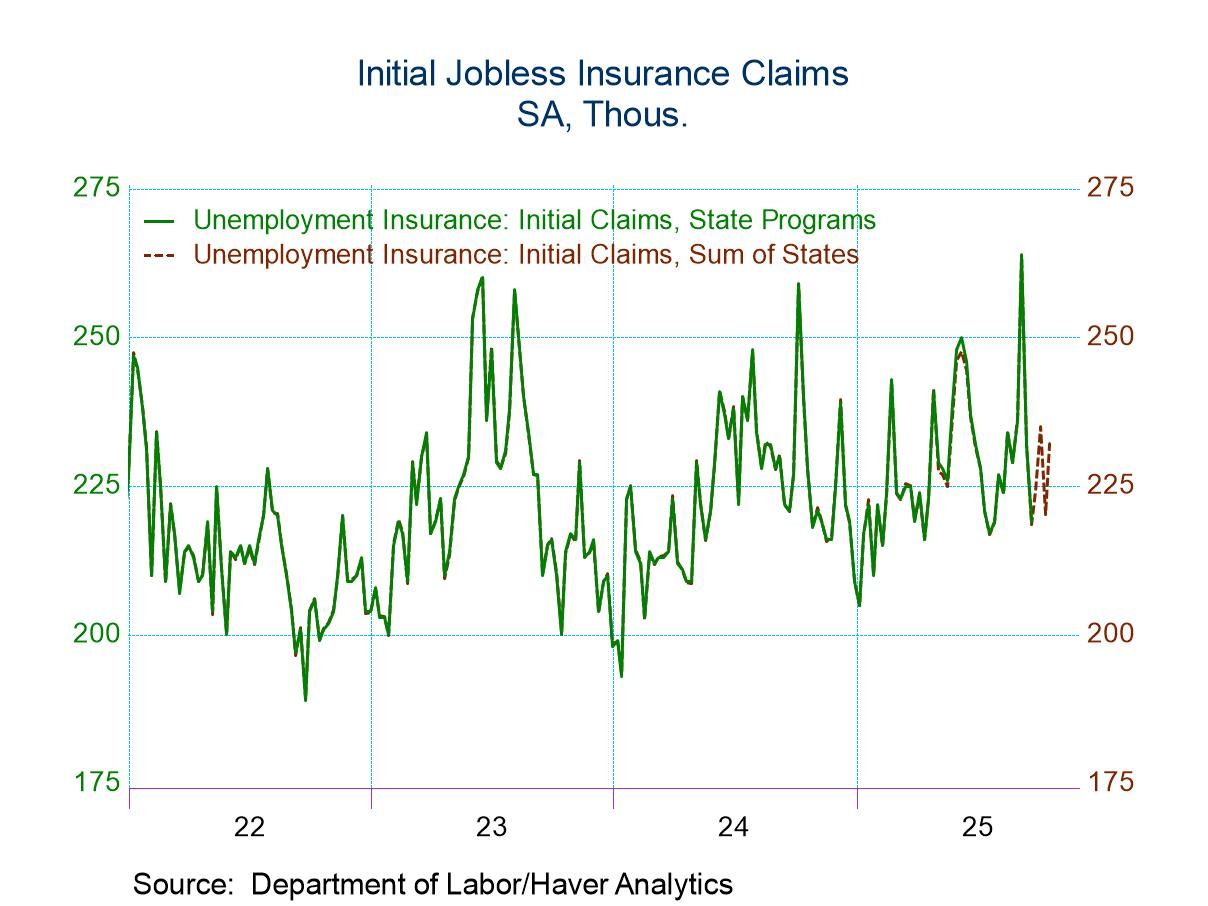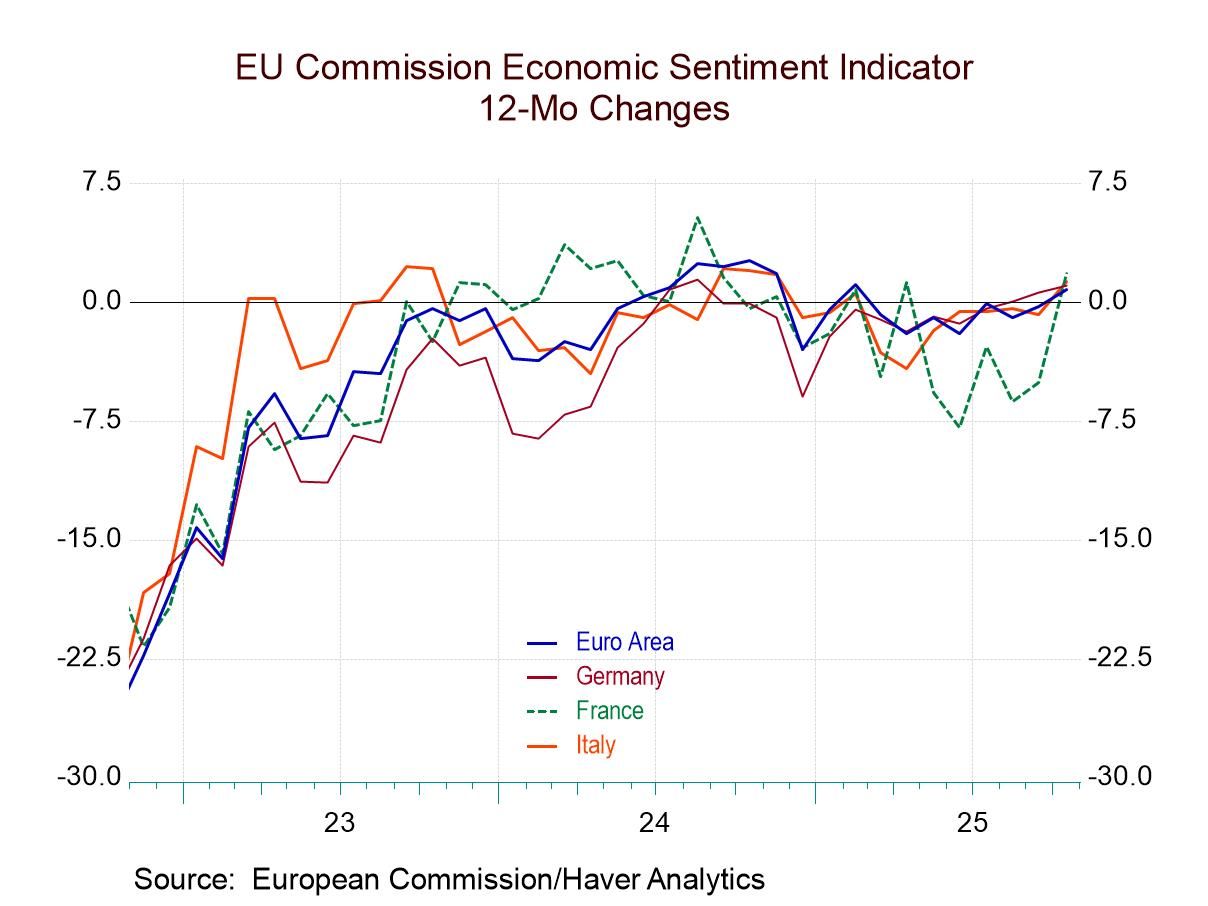 Global| Sep 30 2020
Global| Sep 30 2020Chicago Business Barometer Surges in September
by:Tom Moeller
|in:Economy in Brief
Summary
• Business activity is strengthening. • Pricing power also is improved. The Chicago Purchasing Managers Business Barometer jumped to 62.4 during September from 51.2 in August. It was the highest level since December 2018 and up from [...]
• Business activity is strengthening.
• Pricing power also is improved.
The Chicago Purchasing Managers Business Barometer jumped to 62.4 during September from 51.2 in August. It was the highest level since December 2018 and up from the May low of 32.3. A reading above 50 suggests rising activity in the Chicago area.
Haver Analytics constructs an ISM-Adjusted Chicago Business Barometer with similar methodology to the ISM Composite Index. This measure strengthened to 58.7 in September from 49.7 in August. This measure also was at the highest level since December 2018, up from a low of 40.2 this past June.
Improvement amongst the underlying series was broad-based, led by a surge in the production measure to 67.9 from 52.0. It was the highest reading since August 2018 and up from a May low of 23.7. The new orders measure also jumped to 64.9 from 53.5 as a strengthened 44% (NSA) of companies reported increases and a lessened 18% reported declines. Order backlogs built up to 52.9, the highest level since February of 2019 while inventories strengthened to 47.8, its highest level in four months. The supplier delivery measure rose and showed the slowest delivery speeds since May.
The employment index increased to 45.7 from 41.1. It was the highest reading since January and increased from the June low of 31.9. A strengthened 13% (NSA) of respondents reported more hiring, up from two percent in June. Job cutbacks were steady m/m at 26% of respondents, reduced from 35% in June.
On the inflation front, the prices paid measure rose to 64.7 in September from 55.0 in August. It was the highest level since February 2019 as a strengthened 27% (NSA) reported higher prices. No respondents reported lower prices, greatly reduced from a high of 18% in November of last year.
The MNI Chicago Report is produced by MNI in partnership with ISM-Chicago. The survey is collected online each month from manufacturing and non-manufacturing firms in the Chicago area. Summary data are contained in Haver's USECON database, with detail including the ISM-style index in the SURVEYS database.
| Chicago Purchasing Managers Index (%, SA) | Sep | Aug | Jul | Sep '19 | 2019 | 2018 | 2017 |
|---|---|---|---|---|---|---|---|
| General Business Barometer | 62.4 | 51.2 | 51.9 | 47.1 | 51.3 | 62.4 | 60.8 |
| ISM-Adjusted General Business Barometer | 58.7 | 49.7 | 50.1 | 47.2 | 51.4 | 60.8 | 59.0 |
| Production | 67.9 | 52.0 | 50.6 | 43.0 | 51.2 | 64.5 | 64.2 |
| New Orders | 64.9 | 53.5 | 53.1 | 47.7 | 52.0 | 63.8 | 63.4 |
| Order Backlogs | 52.9 | 46.2 | 47.2 | 45.1 | 46.9 | 58.0 | 55.2 |
| Inventories | 47.8 | 37.3 | 46.3 | 43.6 | 48.7 | 55.4 | 54.9 |
| Employment | 45.7 | 41.1 | 40.1 | 46.6 | 49.6 | 55.3 | 52.9 |
| Supplier Deliveries | 67.4 | 64.5 | 60.3 | 54.9 | 55.6 | 64.8 | 59.4 |
| Prices Paid | 64.7 | 55.0 | 56.9 | 56.0 | 58.5 | 73.9 | 64.0 |
Tom Moeller
AuthorMore in Author Profile »Prior to joining Haver Analytics in 2000, Mr. Moeller worked as the Economist at Chancellor Capital Management from 1985 to 1999. There, he developed comprehensive economic forecasts and interpreted economic data for equity and fixed income portfolio managers. Also at Chancellor, Mr. Moeller worked as an equity analyst and was responsible for researching and rating companies in the economically sensitive automobile and housing industries for investment in Chancellor’s equity portfolio. Prior to joining Chancellor, Mr. Moeller was an Economist at Citibank from 1979 to 1984. He also analyzed pricing behavior in the metals industry for the Council on Wage and Price Stability in Washington, D.C. In 1999, Mr. Moeller received the award for most accurate forecast from the Forecasters' Club of New York. From 1990 to 1992 he was President of the New York Association for Business Economists. Mr. Moeller earned an M.B.A. in Finance from Fordham University, where he graduated in 1987. He holds a Bachelor of Arts in Economics from George Washington University.


